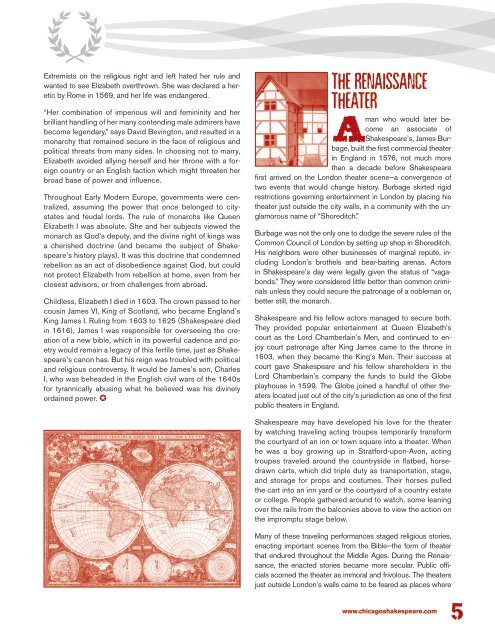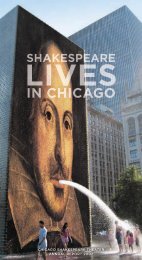Julius Caesar • 2013 - Chicago Shakespeare Theater
Julius Caesar • 2013 - Chicago Shakespeare Theater
Julius Caesar • 2013 - Chicago Shakespeare Theater
You also want an ePaper? Increase the reach of your titles
YUMPU automatically turns print PDFs into web optimized ePapers that Google loves.
Extremists on the religious right and left hated her rule and<br />
wanted to see Elizabeth overthrown. She was declared a heretic<br />
by Rome in 1569, and her life was endangered.<br />
“Her combination of imperious will and femininity and her<br />
brilliant handling of her many contending male admirers have<br />
become legendary,” says David Bevington, and resulted in a<br />
monarchy that remained secure in the face of religious and<br />
political threats from many sides. In choosing not to marry,<br />
Elizabeth avoided allying herself and her throne with a foreign<br />
country or an English faction which might threaten her<br />
broad base of power and influence.<br />
Throughout Early Modern Europe, governments were centralized,<br />
assuming the power that once belonged to citystates<br />
and feudal lords. The rule of monarchs like Queen<br />
Elizabeth I was absolute. She and her subjects viewed the<br />
monarch as God’s deputy, and the divine right of kings was<br />
a cherished doctrine (and became the subject of <strong>Shakespeare</strong>’s<br />
history plays). It was this doctrine that condemned<br />
rebellion as an act of disobedience against God, but could<br />
not protect Elizabeth from rebellion at home, even from her<br />
closest advisors, or from challenges from abroad.<br />
Childless, Elizabeth I died in 1603. The crown passed to her<br />
cousin James VI, King of Scotland, who became England’s<br />
King James I. Ruling from 1603 to 1625 (<strong>Shakespeare</strong> died<br />
in 1616), James I was responsible for overseeing the creation<br />
of a new bible, which in its powerful cadence and poetry<br />
would remain a legacy of this fertile time, just as <strong>Shakespeare</strong>’s<br />
canon has. But his reign was troubled with political<br />
and religious controversy. It would be James’s son, Charles<br />
I, who was beheaded in the English civil wars of the 1640s<br />
for tyrannically abusing what he believed was his divinely<br />
ordained power. ✪<br />
THE RENAISSANCE<br />
THEATER<br />
Aman who would later become<br />
an associate of<br />
<strong>Shakespeare</strong>’s, James Burbage,<br />
built the first commercial theater<br />
in England in 1576, not much more<br />
than a decade before <strong>Shakespeare</strong><br />
first arrived on the London theater scene—a convergence of<br />
two events that would change history. Burbage skirted rigid<br />
restrictions governing entertainment in London by placing his<br />
theater just outside the city walls, in a community with the unglamorous<br />
name of “Shoreditch.”<br />
Burbage was not the only one to dodge the severe rules of the<br />
Common Council of London by setting up shop in Shoreditch.<br />
His neighbors were other businesses of marginal repute, including<br />
London’s brothels and bear-baiting arenas. Actors<br />
in <strong>Shakespeare</strong>’s day were legally given the status of “vagabonds.”<br />
They were considered little better than common criminals<br />
unless they could secure the patronage of a nobleman or,<br />
better still, the monarch.<br />
<strong>Shakespeare</strong> and his fellow actors managed to secure both.<br />
They provided popular entertainment at Queen Elizabeth’s<br />
court as the Lord Chamberlain’s Men, and continued to enjoy<br />
court patronage after King James came to the throne in<br />
1603, when they became the King’s Men. Their success at<br />
court gave <strong>Shakespeare</strong> and his fellow shareholders in the<br />
Lord Chamberlain’s company the funds to build the Globe<br />
playhouse in 1599. The Globe joined a handful of other theaters<br />
located just out of the city’s jurisdiction as one of the first<br />
public theaters in England.<br />
<strong>Shakespeare</strong> may have developed his love for the theater<br />
by watching traveling acting troupes temporarily transform<br />
the courtyard of an inn or town square into a theater. When<br />
he was a boy growing up in Stratford-upon-Avon, acting<br />
troupes traveled around the countryside in flatbed, horsedrawn<br />
carts, which did triple duty as transportation, stage,<br />
and storage for props and costumes. Their horses pulled<br />
the cart into an inn yard or the courtyard of a country estate<br />
or college. People gathered around to watch, some leaning<br />
over the rails from the balconies above to view the action on<br />
the impromptu stage below.<br />
Many of these traveling performances staged religious stories,<br />
enacting important scenes from the Bible—the form of theater<br />
that endured throughout the Middle Ages. During the Renaissance,<br />
the enacted stories became more secular. Public officials<br />
scorned the theater as immoral and frivolous. The theaters<br />
just outside London’s walls came to be feared as places where<br />
www.chicagoshakespeare.com<br />
5




